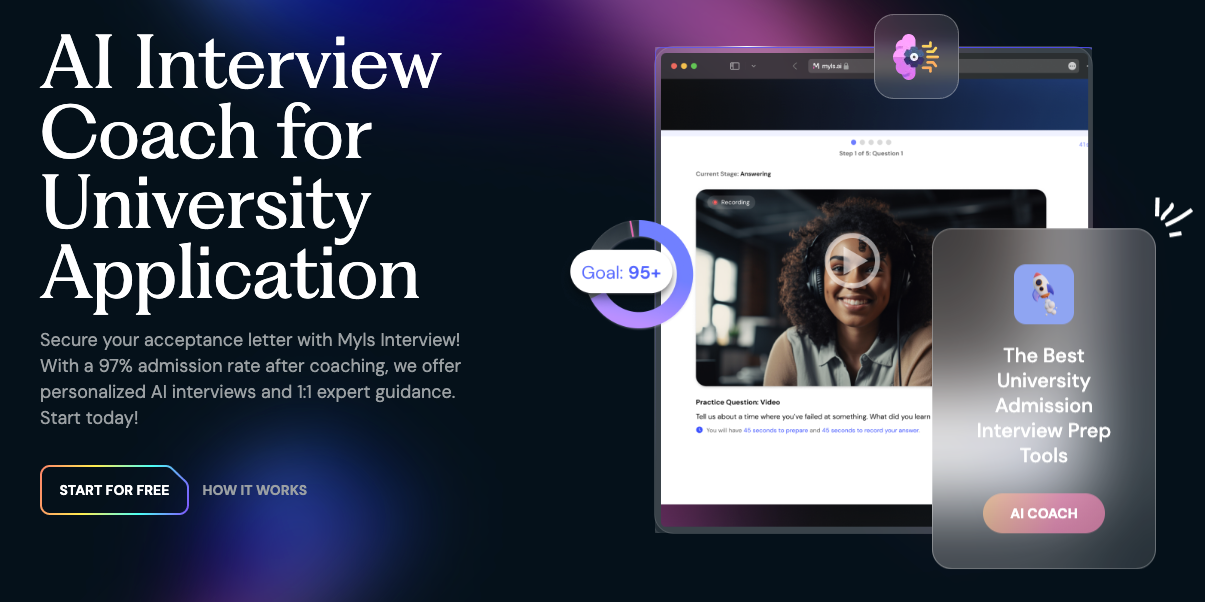MMI Interview Prep Guide: How to Succeed in the Multiple Mini Interview Format
The MMI is one of the most challenging university interview formats. This guide explains what to expect, how to prepare, and how Myls Interview can help you succeed with structure and confidence.

What Is the MMI?
The Multiple Mini Interview (MMI) is a common university admissions interview format used by medical schools, health sciences, and select university programs across Canada—including McMaster Health Sciences, UBC Medicine, University of Toronto’s MD program, and more. Increasingly, competitive undergraduate programs such as nursing, physiotherapy, and even business schools are adopting MMI-style screening.
Unlike traditional interviews, MMIs consist of a series of short, timed stations (typically 6–10), each designed to assess a specific trait or skill. You may be asked to respond to ethical dilemmas, explain your thought process, or even role-play a difficult situation.
It’s fast-paced, high-pressure—and totally learnable with the right strategy.
How Does the MMI Work?
Format Overview:
- 6–10 stations (depending on the program)
- Each station lasts 5–8 minutes
- You rotate between different prompts and interviewers
- You are usually given 2 minutes to read the prompt before entering the station
- Each station assesses specific skills or values such as empathy, communication, critical thinking, or ethical reasoning
Some programs may conduct MMIs virtually via video platform (e.g., Kira Talent or Zoom) or in-person at the university.
What Types of MMI Stations Are There?
MMIs cover a wide variety of scenarios. Here are some common station types:
1. Ethical Dilemmas
You might be asked to discuss what you would do in morally ambiguous situations. Example: “You see a fellow student cheating. What do you do?”
2. Personal Reflection
These questions explore self-awareness and emotional maturity. Example: “Describe a time you failed. How did you grow from it?”
3. Role-Play or Situational Acting
You may interact with an actor playing a distressed patient, customer, or teammate. You must demonstrate empathy, communication, and problem-solving on the spot.
4. Problem-Solving and Critical Thinking
Some stations present you with a hypothetical problem or data set to analyze. Example: “How would you design a fair health policy for vaccine distribution?”
5. Teamwork and Collaboration
You may be asked to reflect on group dynamics, leadership, or conflict resolution. Example: “What makes someone a good teammate?”
What Are MMI Interviewers Looking For?
- Communication skills: Clarity, structure, and audience awareness
- Empathy and emotional intelligence: Understanding others' perspectives
- Critical thinking: Logic, fairness, and nuance in judgment
- Integrity and maturity: Accountability, humility, and ethical consistency
- Adaptability: Staying calm and focused under pressure
They are not necessarily looking for a "right" answer—just a thoughtful, well-reasoned, and authentic one.
How to Prepare for MMI Success
1. Practice Timed Responses
The MMI is all about thinking on your feet. Time yourself reading and responding to prompts aloud in 6–8 minute blocks. Practice pausing, organizing your ideas, and speaking calmly.
2. Use a Structured Approach
One popular framework is SPIES (Situation, Problem, Implications, Ethical Principles, Solution) for ethical stations. You can also use PREP (Point, Reason, Example, Point again) for reflective questions.
3. Build a Bank of Experiences
Draw from your real-life experiences in volunteering, academics, part-time jobs, and extracurriculars. Prepare short stories about:
- A time you helped someone in distress
- A time you resolved a conflict
- A time you received difficult feedback
4. Get Comfortable with Role-Play
Even if it feels awkward at first, role-playing helps build confidence. Record yourself or practice with a coach simulating real MMI scenarios.
5. Reflect on Current Issues
Stay informed about relevant ethical and social topics—especially those tied to healthcare, education, or leadership. Practice forming balanced opinions and considering multiple sides.
Common MMI Pitfalls to Avoid
- Speaking too quickly or rambling without structure
- Trying to memorize perfect answers (MMIs value spontaneity)
- Being too opinionated without showing perspective-taking
- Avoiding vulnerability or personal reflection
- Skipping the opportunity to connect your ideas to real-world implications
How Myls Interview Can Help You Succeed

At Myls Interview, we help you turn nervous energy into confident, thoughtful performance. Whether you're preparing for a virtual MMI or a high-stakes in-person interview session, we offer expert coaching, timed practice, and structured feedback to help you improve fast.
Here’s how we support you:
- Mock MMI simulations
Practice with real prompts in a live, timed environment. Our mock interview platform provides simulate interview conditions and give AI-generated personalized feedback after every station. - Response structure coaching
We teach you how to organize your thoughts quickly and clearly using frameworks that match each question type. - Role-play development
We help you master high-pressure role-play scenarios, teaching empathy, tone, and verbal de-escalation skills that make you stand out. - Ethics and critical thinking guidance
Unsure how to navigate moral grey zones? We help you frame your answers with logic and compassion—even when there’s no “right” answer. - Confidence and mindset training
We work with students on stress management, mindset, and nonverbal cues so they feel calm, clear, and in control.
Whether you're aiming for McMaster Health Sci, UBC Medicine, or a competitive allied health program, Myls Interview prepares you to walk into the MMI with structure, strategy, and confidence.
Start your MMI prep with Myls Interview today—sign up for free and get expert help that gets results.



